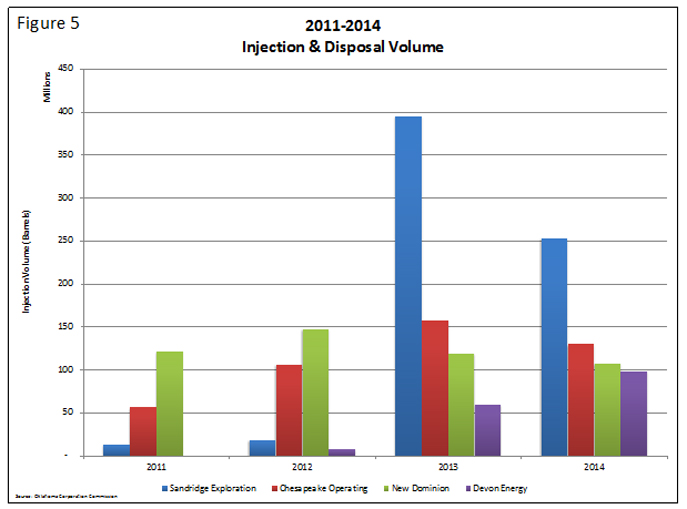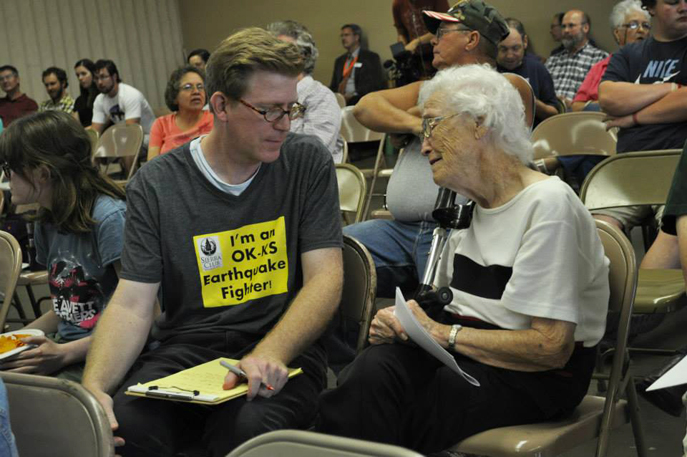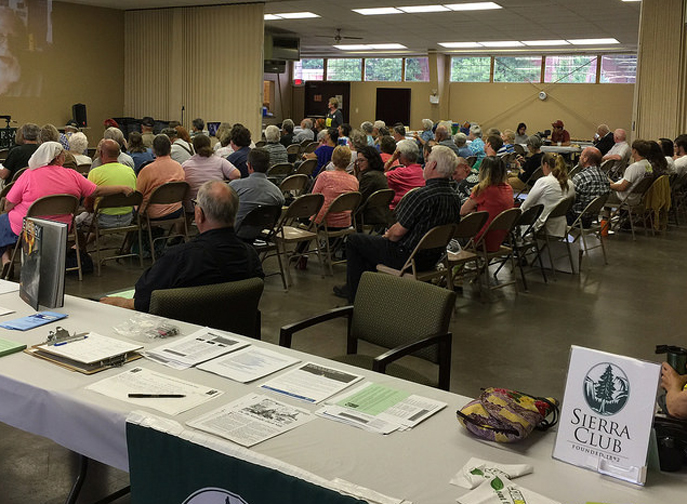Oklahoma Oil Companies' Wastewater Disposal Practices Leave Residents Shaken
For the past few years, residents of Oklahoma and Kansas have been battling a bizarre and devastating environmental threat: human-induced earthquakes, caused by oil and gas companies pumping massive quantities of polluted water underground. To help protect the citizens of Oklahoma and Kansas from this serious threat, yesterday the Sierra Club filed a federal lawsuit against three of the major culprits for disposing of waste in such a way that it causes or contributes to an “imminent and substantial endangerment” to public health and the environment in violation of the Resource Conservation and Recovery Act (RCRA). We discuss the lawsuit here. The Club is represented by Richard Webster of Public Justice and co-counsel Robin Greenwald of Weitz & Luxenberg, Scott Poynter of the Poynter Law Group, and Bill Federman of Federman & Sherwood.
A recent article in the New Yorker brought the problem national attention and explained the situation well. By the mid-1990s, Oklahoma’s oil fields had been thoroughly tapped, and additional oil recovery was not profitable. One of the principal problems was that the oil fields companies currently tap are very waterlogged, either naturally or as a result of the water injected by oil companies themselves over the years. As a result, new wells would bring up ten or twenty times as much water as oil. Beginning a little over ten years ago, however, recovery from these fields was again profitable as the price of oil soared and new technology made dewatering easier. But the polluted water still had to go somewhere, and waste fluid from fracking—where the companies inject a watery chemical cocktail into the ground at high pressure in order to fracture shale rocks and release natural gas or oil inside—only added to the load.
Oil companies have traditionally reinjected these “production wastes” underground, theoretically deep enough that it will not interact with any drinking water aquifer, rather than finding a way to treat it and dispose of it by other means, which would cost them significantly more money to do. Using the new recovery processes, oil companies have billions of new gallons of polluted water to dispose of annually, but they continue to thoughtlessly use the same disposal method. The rate of re-injection has increased astronomically over recent years.

Image: Public Justice
The Sierra Club’s “notice of intent to sue” letter vividly illustrates the increases in production waste disposal and resulting earthquakes. The increased disposal has brought swarms of earthquakes to a region that hasn’t seen significant seismic activity in millennia, increasing the number of magnitude-3 or larger earthquakes in north-central Oklahoma by nearly 300 times, or approximately 30,000%. Strikingly for a very oil and gas-friendly state, in 2015 Oklahoma state geologists officially recognized that the quakes are caused by wastewater injection, and later the Governor also clearly acknowledged the link.

Image: Public Justice
Not only has the number of earthquakes increased dramatically, but so too has their severity, as the above graph shows, and the earthquakes have already caused serious injuries and property damage. The scale to classify earthquakes is logarithmic, meaning that a magnitude 4 earthquake is 10 times more powerful than a magnitude 3, and a magnitude 5 earthquake is 100 times more powerful than a magnitude 3. Furthermore, it’s a law of seismology that swarms of smaller earthquakes suggest a larger one may be on its way. Scientists at the United States Geologic Survey (USGS) warn that the smaller earthquakes are reawakening long-dormant, 300-million-year-old fault lines across Oklahoma that could trigger much higher-magnitude earthquakes. If a large earthquake hit the Oklahoma City area, it could cause thousands of injuries and even fatalities.
The quakes also threaten catastrophic environmental harm, mainly through the inevitable rupture of the storage and transportation infrastructure for hazardous materials. This poses a special threat in Oklahoma. If a large earthquake struck the massive oil storage area in Cushing, truly huge amounts of oil could be released. Cushing is one of America’s largest oil-holding facilities, taking in oil from across the U.S. as well as receiving pipelines from Gulf of Mexico offloading operations. As fracking has generated a glut of oil on world markets, it has also filled Cushing’s massive oil storage facilities, as investors wait to sell it at higher prices. Cushing currently stores approximately 55 million barrels of oil. The storage tanks in Cushing were built to national standards that account for some shaking, but they weren't constructed with serious earthquakes in mind. Many of the tanks were built in the 1920’s, and the likelihood that a strong earthquake could rupture Cushing’s storage tanks and affect the nation’s energy supply has even become a matter of national security, recently attracting the attention of the U.S. Department of Homeland Security, in addition to USGS.
The Sierra Club’s Oklahoma and Kansas Chapters have been leading voices in the public outcry demanding regulators do something about the ongoing threat. We in the Law Program have been discussing the issue with both of the chapters over the past months, and we want to share a few of their choice words on the subject:
“Oklahoma’s state government is failing its citizens on this issue—we met dozens of rural home owners last summer who literally cried telling me their stories—until you are awakened every night for months on end because an earthquake woke you up, you cannot imagine the psychological toll this is taking on our citizens—massive across-the-board injection volume reductions should have been taken years ago. People should always be more valuable than profits.” - Johnson Bridgwater, Director of the Oklahoma Chapter

During a "Kansas-Oklahoma Fighters Meeting," Johnson met with 93-year-old Ada Mae Mott, a resident of Medford, Oklahoma, who was thrown to the ground in her kitchen during an earthquake.
“Kansas is a low-regulation state when it comes to the oil and gas industry. The Kansas Chapter has worked for the past five years to put stronger rules and regulations on the books of Kansas, but to no avail. Kansas officials deny the earthquake surge in Kansas corresponds to increased oil and gas activity in southern Kansas and northern Oklahoma. Kansans are at risk on a daily basis, and damages are already mounting into the millions of dollars.” – Zack Pistoria, Kansas Chapter

Oklahoma-Kansas joint screening of the fracking documentary, Groundswell Rising.
So long as government regulators lack the resources or the will to deal with this problem and force oil companies to dispose of their waste safely, people and the environment remain at serious risk. Just this past weekend, northern Oklahoma suffered a magnitude 5.1 quake, the third most powerful in the state’s recorded history. In response, Oklahoma regulators issued a “Regional Earthquake Response Plan for Western Oklahoma.” While we in the Law Program haven’t fully reviewed the plan yet, it appears to be too little too late. For example, the plan—which appears to rely on oil companies’ voluntary compliance—calls for reducing the amount of water injected in the region covered by the plan by “about 40 percent.” Given the explosion in injection rates over the past few years, however, this still allows companies to inject far more production waste than they have in the past. Furthermore, the region covered by the plan does not include Cushing or Oklahoma City.
By addressing the ongoing earthquake risk, the Sierra Club’s lawsuit follows in the best tradition of citizen enforcement of public health and environmental laws. Congress put “citizen suit” provisions into laws like RCRA as a backstop, to ensure that citizens who suffer from the government’s chronic failure to enforce the law have some way to protect themselves. The Sierra Club stands with the citizens of Oklahoma and Kansas, who deserve protection from the irresponsible practices of a handful of oil companies.
Contacts:
- Jonathon Berman, Sierra Club, (202) 495-3033, Jonathon.Berman@sierraclub.org
- Steve Ralls, Public Justice, (202) 861-5246, sralls@publicjustice.net
- Phil Singer, Weitz & Luxenberg PC, (202) 528-1462, phil@marathonstrategies.com
